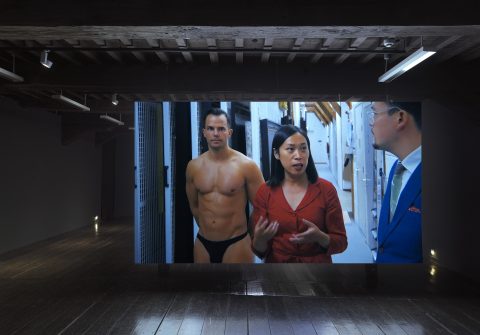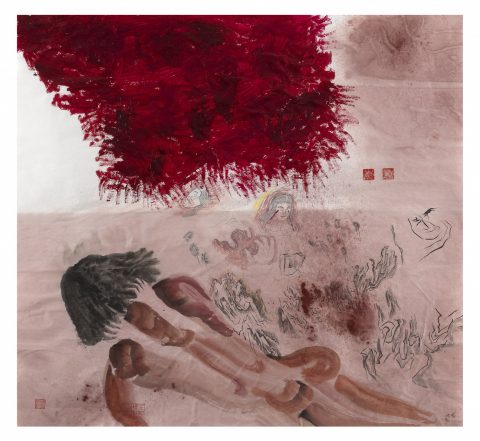Rising artist to watch: Evelyn Taocheng Wang
- Evelyn Taocheng Wang, ‘Allegory of Transience’, De Hallen Haarlem 2017. Courtesy Galerie Fons Welters. Photography by Gert Jan van Rooij.
- Evelyn Taocheng Wang, ‘Allegory of Transience’, exhibition overview, De Hallen Haarlem 2017. Courtesy Galerie Fons Welters. Photography by Gert Jan van Rooij.
- Evelyn Taocheng Wang, Dorothea von Stetten Kunstpreis 2016, Kunstmuseum Bonn Courtesy Galerie Fons Welters.
- Evelyn Taocheng Wang, Dusk, 2017, video still, De Hallen Haarlem. Courtesy Galerie Fons Welters. Photography by Gert Jan van Rooij.
- Evelyn Taocheng Wang, The Interview, 2017, video still, De Hallen Haarlem. Courtesy Galerie Fons Welters. Photography by Gert Jan van Rooij.
- Taocheng Wang, Give Clients Tap Water, We drink Mineral Water, Fill up Empty Mineral Water Bottle with Tap Water, 2015 Courtesy Galerie Fons Welters.
- Taocheng Wang, Title A Client fainted after Recept Massage Treatment, 2015 Courtesy Galerie Fons Welters.
- Taocheng Wang, Yang And Her Pakistani Boyfriend Were Communicating Via Google-Translate on Their Iphone Behind of A Curtain of My Bed-partition., 2015 Courtesy Galerie Fons Welters.
‘I don’t get you Tao! 34 years and you still do massage with us?’. This is how Liza addressed to the artist and workmate Evelyn Taocheng Wang (Chengdu, 1981) when she found out her age. For five months Wang has worked at Chinese Jade Massage salon in Amsterdam’s Red Light district. Having travelled from China to pursue an international education as a painter, she financed her stay by becoming a masseuse. ‘Growing up, I never would have imagined that I would do a massage job to make a living – she says – I think this job, since it is seen as a very low one, is for someone who uses their full identity because the communication/connection between people is based on touch rather than polite, daily conversation’. Unintended Experience (A job in Amsterdam) is a volume published on the occasion of the artist’s first institutional solo show Allegory of Transience, which opened at De Hallen Haarlem, Netherlands, in January of this year simultaneously with two more solo shows by Kasper Bosmans and Richard Tuttle. The book collects evocative accounts of Taocheng Wang’s employment in the massage parlour. The diaries first appeared on the artist’s Facebook page in 2015 and in the two intervening years, she adapted the texts into a series of works titled Massage near me.
In Evelyn’s classic drawings and paintings, as well as in her videos and performances, she combines a straightforward and at times confrontational tone with emotional, poetic and autobiographical undercurrents. Through her diverse practice, she addresses fixed notions of identity, sexuality, gender roles, ethnicity and socio-economic backgrounds. ‘I never had to work such a difficult, physical job before – she recalls – when I started I didn’t have any experience as a masseuse, so I was only allowed to work on tourists or new clients. Old clients are picky. Sometimes I cannot do it well and need to practice more without payment’.
Wang is an artist, which is known in the salon, as well as transgender, which isn’t. This central dramatic irony reflects Wang’s narration, as her colleague discuss love, sex, men, work and each other. ‘This massage salon only hires girls, cisgendered girls. I am not one of these girls so I have to pretend and perform as one. I am afraid of being recognized and fired everyday’. The artist carries on saying ‘The majority of clients are male, many of them come for massage only because of sexual desire, which means they do not really want a normal massage. This makes my identity a very difficult and embarrassing situation. I still need to smile at them and make them feel happy’.
The drawings on rice paper, exhibited at Company Gallery in New York (2015) and during Manifesta 11 (2016), stylize the recognizable elements of low-cost wellness as a dreamy, fluid plane. Toacheng Wang’s difference in the parlour, however, is a companion to her affinity. As Tess Edmondson notes on Flash Art (March-April 2017, no. 313) ‘like her colleagues, she is subject to racism, misogyny and sexual harassment when interfacing both with those who buy her labour and with the world beyond […] as a consequence, another animating drama in Massage Near Me is the perpetual struggle of the masseuses against their clients who mistake their services for sex work, or those who purposefully transgress the parlour’s strictly therapeutic protocol as it happens in Tracy and Yang was kicking an older male client out, because of he was trying to jerk off on towel (2015)’. Also written in an imperfect English, another drawing bears the following title Wind from our electrical fan is also strong, Sir! or A Hongkong-Dutch clint licking my arm during the massage treatment.
This use of not standard language carrying unorthodox grammar and associations, has its own specific poetry and humour. Noisy at times, as the viewer is directly involved as witness of the scene happening. Besides, it underlines the artist’s outsiderness even if, as Taocheng points out ‘we are all Chinese, we are all outsiders to each other and to the Netherlands’. The artist, who won both De Volkskrant Beeldende Kunst Prijs and the Dorothea von Stetten-Kunstpreis in 2016, is currently showing at the Frans Hals Museum and at the Hallen Haarlem Museum, as previously said. But the upcoming seasons are witnessing an important involvement on several fronts as she will exhibit at Carlos/Ishikawa, London, in May, at her gallery Fons Welters, Amsterdam, in November and, most notably, at Documenta 14, Kassel, in the performance section.
April 21, 2017








